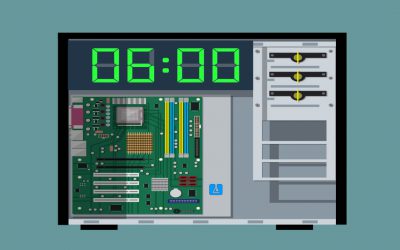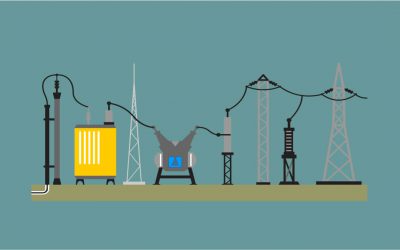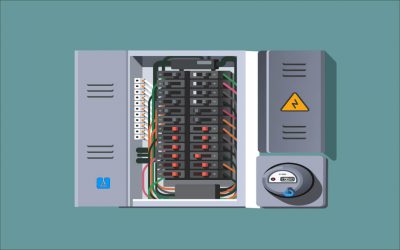The Renewable Energy Training lab consists of many Renewable Energy Training system which covers most of the subject matter in Renewable Energy starts with a variety of courses providing in-depth coverage of topics related to the field of Renewable energy such as Solar Power, Wind Power, Home Energy Production, Hydrogen Fuel Cell, Nacelle – Wind Power Generation, Solar Thermal, Geothermal, and Pitch Hub. The lab system combines a modular design approach with computer-based data.
This lab enables students to apply various experiments and activities in Renewable Energy, which covers the following topics
Basic Renewable Energy
- Voltage, Current, and Ohm’s Law
- Equivalent Resistance
- Power in DC Circuits
- Series and Parallel Circuits
- Battery Fundamentals
- Discharge Characteristics
- Battery Charging Fundamentals
- Battery Charging Methods
- The Diode
- The Solar Panel (Photovoltaic Panel)
- Effect of Temperature on Solar Panel Performance
- Storing Energy from Solar Panels into Batteries
- Effect of Shading on Solar Panel Operation
- Solar Panel Orientation (optional)
- Solar Panel Performance versus Insolation (optional)
- Voltage-Speed Characteristic of a Wind Turbine Generator
- Torque-Current Characteristic of a Wind Turbine Generator
- Power versus Wind Speed
- Storing the Energy Produced by a Wind Turbine into Batterie
Solar Power
- Voltage, Current, and Ohm’s Law
- Equivalent Resistance
- Power in DC Circuits
- Series and Parallel Circuits
- The Diode
- The Solar Panel (Photovoltaic Panel)
- Effect of Temperature on Solar Panel Performance
- Storing Energy from Solar Panels into Batteries
- Effect of Shading on Solar Panel Operation
- Solar Panel Orientation (optional)
- Solar Panel Performance versus Insolation (optional)
Small-Scale Wind Power Electricity Generation
- Voltage, Current, and Ohm’s Law
- Equivalent Resistance
- Power in DC Circuits
- Series and Parallel Circuits
- Battery Fundamentals
- Discharge Characteristics
- Battery Charging Fundamentals
- Battery Charging Methods
- Voltage-Speed Characteristic of a Wind Turbine Generator
- Torque-Current Characteristic of a Wind Turbine Generator
- Power versus Wind Speed
- Storing the Energy Produced by a Wind Turbine into Batteries
Home Energy Production
- Voltage, Current, and Ohm’s Law
- Equivalent Resistance
- Power in DC Circuits
- Series and Parallel Circuits
- Battery Fundamentals
- Discharge Characteristics
- Battery Charging Fundamentals
- Battery Charging Methods
- The Diode
- The Solar Panel (Photovoltaic Panel)
- Effect of Temperature on Solar Panel Performance
- Storing Energy from Solar Panels into Batteries
- Effect of Shading on Solar Panel Operation
- Solar Panel Orientation (optional)
- Solar Panel Performance versus Insolation (optional)
- Voltage-Speed Characteristic of a Wind Turbine Generator
- Torque-Current Characteristic of a Wind Turbine Generator
- Power versus Wind Speed
- Storing the Energy Produced by a Wind Turbine into Batteries
- The Diode and Switching Transistor
- The Buck Chopper
- Introduction to High-Speed Power Switching
- Ripple in Choppers
- The Lead-Acid Battery Charger
- The Boost Chopper
- The Buck/Boost Chopper
- The Four-Quadrant Chopper
- The Sine Wave
- Phase Angle and Phase Shift
- Instantaneous Power and Average Power
- Inductive Reactance
- Capacitive Reactance
- Impedance
- Active and Reactive Power
- Apparent Power and the Power Triangle
- Solving Simple AC Circuits using Circuit Impedance Calculation
- Solving AC Circuits Using the Power Triangle Method
- Voltage and Current Ratios
- Transformer Winding Polarity and Interconnection
- Transformer Losses, Efficiency, and Regulation
- Transformer Rating
- Effect of Frequency on Transformer Rating
- The Autotransformer
- Power Diode Single-Phase Rectifiers
- The Single-Phase PWM Inverter
- High-Frequency Power Transformer Operation
- Stand-Alone Home Energy Production
- The Single-Phase Grid-Tied Inverter (PWM Rectifier/Inverter)
- Grid-Tied Home Energy Production Using a Solar or Wind Power Inverter without DC-to-DC Converter
- Grid-Tied Home Energy Production Using a Solar or Wind Power Inverter with DC-to-DC Converter
- Large-Scale Energy Storage: A Step in the Implementation of the Smart Grid
Hydrogen Fuel Cell
- The Basic Functions of the Fuel Cell System
- The Characteristic Curve of a Fuel Cell
- Parameters Influencing the Characteristic Curve
- Determination of the Hydrogen Current Curve
- Efficiency of the Fuel Cell Stack
- Set-up of a Fuel Cell Power Supply
- Efficiency of a Fuel Cell Power Supply
- Fuel Cell Application I: Remote Traffic Light
- Fuel Cell Application II: Fuel Cell Car
Nacelle – Wind Power Generation
- Nacelle Familiarization, Safety, and Control System
- User Interface and Wind Simulation
- Hub and Low-Speed Shaft
- Gearbox, Coupling, and Alignment
- Basic Hydraulic Circuit
- Hydraulic Brakes
- Electrical Circuit and Panel
Solar Thermal
- Troubleshooting Introduction to Solar Thermal Energy
- Solar Thermal Energy Systems
- Multi-Loop Systems
Geothermal
- Geothermal Energy
- The Ground Loop
- Heat Pump Connections and Interior Piping
- Heat Pump Control and Safety
- The Refrigeration Cycle
- Psychrometrics
- Geothermal Heat Pumps
- Heat Exchangers
- Heat Pump Control and Safety Devices
- System Characterization
- Maintenance and Troubleshooting
- Geothermal Software Design Tools
Electrical & Hydraulic Pitch Hub
- Introduction to Energy Production with Wind Power
- Machine Safety
- SCADA Introduction
- Rotor
- Electric Pitch Control Operation
- Electrical System
- Backup Power
- Hydraulic System and Pitch Control Operation
- Electrical System
- Troubleshooting

.jpg)


